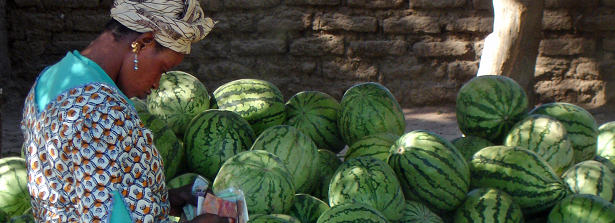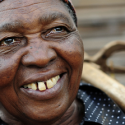Inclusive business: from attention to action

As a key theme, inclusive business in international development has been on the agenda for some years now. With attention maintained in 2015, the growth of this trend is projected to continue in the long run. In addition to important organizations and networks, the Food & Business Knowledge Platform (F&BKP) remains committed to the development of the knowledge agenda on inclusive business as to ensure the agenda’s translation into effective action. This article provides a brief overview of several past international events with inclusive business high on the agenda, as well as a description of F&BKP activities related to this theme.
The potential of inclusive business recognized
At a workshop in Turkey in April 2015, the G20 highlighted inclusive business (IB) as an excellent pathway for the private sector to contribute to tackling poverty and stimulating sustainable and inclusive growth. Building on the work that the G20 started since 2011 and in cooperation with participating businesses, the workshop produced messages and recommendations for the G20 to use in developing a common framework and policy environment for IB. The report of the workshop can be found here.
In the Netherlands at the Ministry of Foreign Affairs, Dr Bekele Shiferaw, the Executive Director of PEP, emphasized in a presentation that the key challenge for Africa is to translate rapid economic growth into inclusive growth for poverty reduction and employment. As agriculture remains one of the key economic sectors in reducing poverty in Sub-Saharan Africa, the integration of farmers into inclusive value chains is crucial as Shiferaw stated.
The role of agriculture as a key sector within IB was confirmed by contributors of a consultation organized by the Include Platform at the request of the Dutch Ministry of Foreign Affairs. In the insights from the consultation on how to promote inclusiveness in the Dutch policy agenda on trade and international cooperation, boosting agricultural productivity was highlighted as one of the key issues. Involving groups of farmers, stimulating food and nutrition security and addressing rural unemployment has revealed a reduction in rural-urban inequalities, an easing of rural-urban migration pressures and an alleviation of rural and urban poverty.
More companies are becoming involved with the topic of IB, and not just the donors. Companies such as PEPSICO, Ben & Jerry’s and Facebook have helped make the 2015 BoP Global Network Summit possible by becoming sponsors. This summit brought together 200 participants from more than 30 countries to share experiences and learn from top academics and practitioners in the field. They discussed how to promote IB in increasingly competitive markets from the bottom up. For more information on this summit and its outcomes, please visit this website.
The response from policy makers and the private sector is overall positive in promoting IB in developing countries and emerging economies. However, attention alone will not result in the improvement of good IB practices where it really matters. This focus needs to be translated into action but the question remains of how to do so and effectively. Although networks and organizations like the WBCSD, IFC, SNV, Seas of Change and the BoP Global Network have done relevant work over the years, there are still questions to be answered.
Questions to be answered
Key questions on how to stimulate IB in rural areas are rooted in the challenge of transforming agriculture. If done successfully, IB could provide business opportunities and attractive employment opportunities for youth. One particular question focuses on IB and if resources are used effectively in stimulating IB development. Policy makers are struggling in finding answers as Dr Bekele Shiferaw expressed in his presentation with the following concerns:
- What does agricultural transformation look like and how can agriculture be transformed into an attractive field to work in?
- What is the role of aid and trade in agricultural transformation and rural development? Is a system approach the solution?
- What are the potential effects of inclusive regional trade on employment, specifically for the youths, and food security?
- What should be the key focus in policy as to enhance productive employment and reduce poverty?
- What approach should be adapted to improve productive employment in fragile contexts?
In relation, the following question was proposed at the celebratory event of the BoP Inc.’s fifth anniversary: to what extent are specific IB advisory services needed for enterprises to be successful? Answering knowledge questions related to IB such as these relates to the role of the F&BKP in supporting research and learning initiatives on this theme.
F&BKP activities
Currently, the F&BKP is supporting a number of activities aimed at different knowledge questions: with the eventual answers, scaling up successful IB practices can be achieved. Recently, BoP Inc. completed a study issued by the Dutch Embassy in Bangladesh and the F&BKP. The main research question addressed whether increased standards in the food sector resulted in exclusive or inclusive growth (for smallholder farmers). The study found, amongst others, that increased demands around food safety currently do not reach the majority of smallholder farmers in Bangladesh. It was also found that local agricultural markets are still rather isolated and therefore are not influenced by the increasing demand for safe food in more advanced markets. The report of the study can be found here.
In the linked report, there are recommendations for areas that need further research in order to better understand the interaction between inclusiveness and quality standards. The objectives of the recommended research are:
- Better understanding farmer decision making
- Supporting the development of market introduction strategies
- Identifying sound transition strategies for the brokering role of food security programs
For Seas of Change, the big question for the coming decades is how to build on successful IB practices in order to achieve inclusive development at a larger scale. Additional questions on this topic include: what are the opportunities for rapidly implementing good ideas into practice at a larger scale; which inspirational examples are emerging and; how is it possible to effectively invest in local entrepreneurship and inclusive agri-food sector growth?
The F&BKP is supporting Seas of Change in finding answers to these questions. Seas of Change has on several occasions been able to align practitioners in participatory workshops to share their experiences and insights. Complementary to these workshops, publications and other resources have been developed in order to stimulate scaling up of promising IB practices. Amongst other organizations, the F&BKP is supporting Seas of Change in engaging with SMEs in East Africa to learn and share experiences on how to integrate business and social impact, as well as how to successfully transfer knowledge for business improvement. The work with East African SMEs will also feed the development of inclusive business guidelines, online training materials and other resources.
In Hanoi on September 23 and 24, 2015, Seas of Change will be co-organizing a roundtable on inclusive agribusiness in South East Asia, together with the World Economic Forum’s Grow Asia Partnership, the Australian Department of Foreign Affairs and Trade, Australia’s Food Systems Innovation Initiative and the Global Donor Platform for Rural Development. One hundred leading representatives from businesses, farmer associations, research institutions and development organizations will participate in this roundtable which will be a key step in building a regional network of strategic stakeholders for continued exchange and innovation. It will help identify specific opportunities for investment in agricultural development, barriers to growth, critical areas for future innovation and research and policy requirements to drive greater business-led inclusive growth. It will explore practical and innovative solutions for those challenges of growing inclusive agribusinesses in South East Asia and further provide a forum to share experiences and lessons learned.
Need for more research
Research and innovation are not just key topics at the roundtable. In its declaration of April 2015, the G20 emphasized that more research is necessary for IB policy and practice. In efforts to answer the key questions formulated above, academic research will also need to play a role. For this reason, NWO-WOTRO in the context of the F&BKP has recently awarded nine GCP research programs on Inclusive Business on such topics as “Inclusive agricultural business models for food security” and “Local and International business collaboration for productivity and Quality Improvement in Dairy chains”. These are multiyear research projects with the potential to dive deeper into their respective research topics.
In conclusion, the F&BKP hopes to contribute in drawing attention to IB and translate those efforts into action. This will be done specifically by identifying pathways for eventual and effective results. The F&BKP remains committed to developing the IB knowledge agenda and bringing together networks and organizations that are able to contribute to providing answers to these key knowledge questions.






